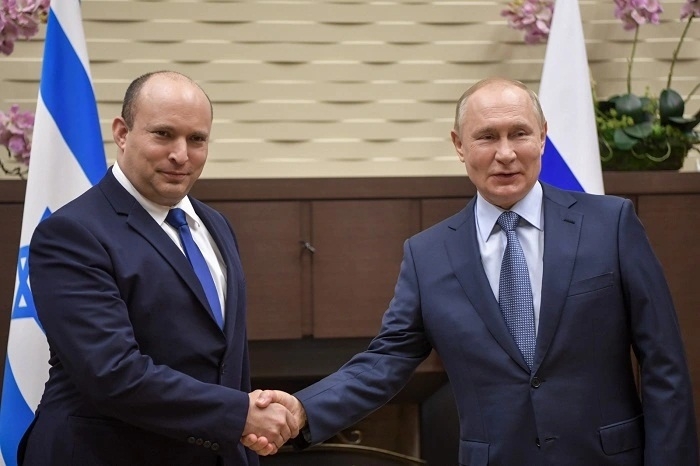ATUL ANEJA New Delhi, March 7: Israeli Prime Minister Naftali Bennett flew in his private jet on Saturday, and headed straight to meet Russian President Vladimir Putin in Moscow. The two leaders had a long three-hour meeting primarily on the situation in Ukraine. Bennett then reached out the Ukrainian President Volodymyr Zelensky, who is, in any case seeking Israeli help to defuse his country's feud with Moscow. "Prime Minister of Israel @naftalibennett called me after his meeting with Vladimir Putin. We continue dialogue," declared Zelensky in a statement. The Israeli Prime Minister diplomatic marathon then took him to Berlin to meet with German chancellor Olaf Scholz. According to the Israeli media reports Bennet could also be heading to Paris, to meet with French President Emmanuel Macron, who has so far been the key link between Putin and the West. So, why has Bennet taken the unusual step of breaking Sabbath to mount an energetic diplomatic blitz? There are two key reasons that explain Bennet's activism. First, as the chief patron of safeguarding Jewish interests worldwide, Israel is naturally interested in Ukraine. It is estimated that an estimated 50,000-200,000 jews reside in Ukraine whose lives could be endangered because the war, which is likely to remain protracted. Ukrainian Jewish community lives mostly in four cities: Kyiv, Dnipro, Kharkiv and Odessa. Israel has been seriously concerned by the rise of the neo-Nazi groups, who are also in Putin's cross-hairs, after the Maidan square uprising in 2014. Since 2014, hundreds of Jews have reportedly fled Donetsk and Luhansk, which is in the eye of the on-going conflict between Russia and Ukraine. During his conversation, the Israeli prime minister raised "the issue of the large Jewish community caught up in the war in Ukraine," Russia Today reported. Second, there are other domestic compulsions that are driving Bennet's mediation effort. A sizeable number of Russian Jews, which have their connections with Moscow, have migrated to Israel. No government can alienate this electorally important constituency. Israel has a deep understanding of the state of play inside the conflict zone, and connections on both sides to make its mediation purposeful. For instance, Israel's minister of Construction and Housing Minister Zeev Elkin, is accompanying Bennet in his diplomatic initiative. Elkin was born in Kharkiv, an area which is in the conflict zone, and where some members of his family still reside. Significantly, for over a decade, Elkin, a fluent Russian speaker has been translating Putin for Israeli prime ministers. According to The Jerusalem Post he is the government's leading Kremlinologist. (The content is being carried under an arrangement with indianarrative.com)
Why has Israel decided to mediate big-time in the Ukraine-Russia conflict?
- by Rinku
- March 07, 2022 2 minutes

Why has Israel decided to mediate big-time in the Ukraine-Russia conflict?.(Photo:IN)











